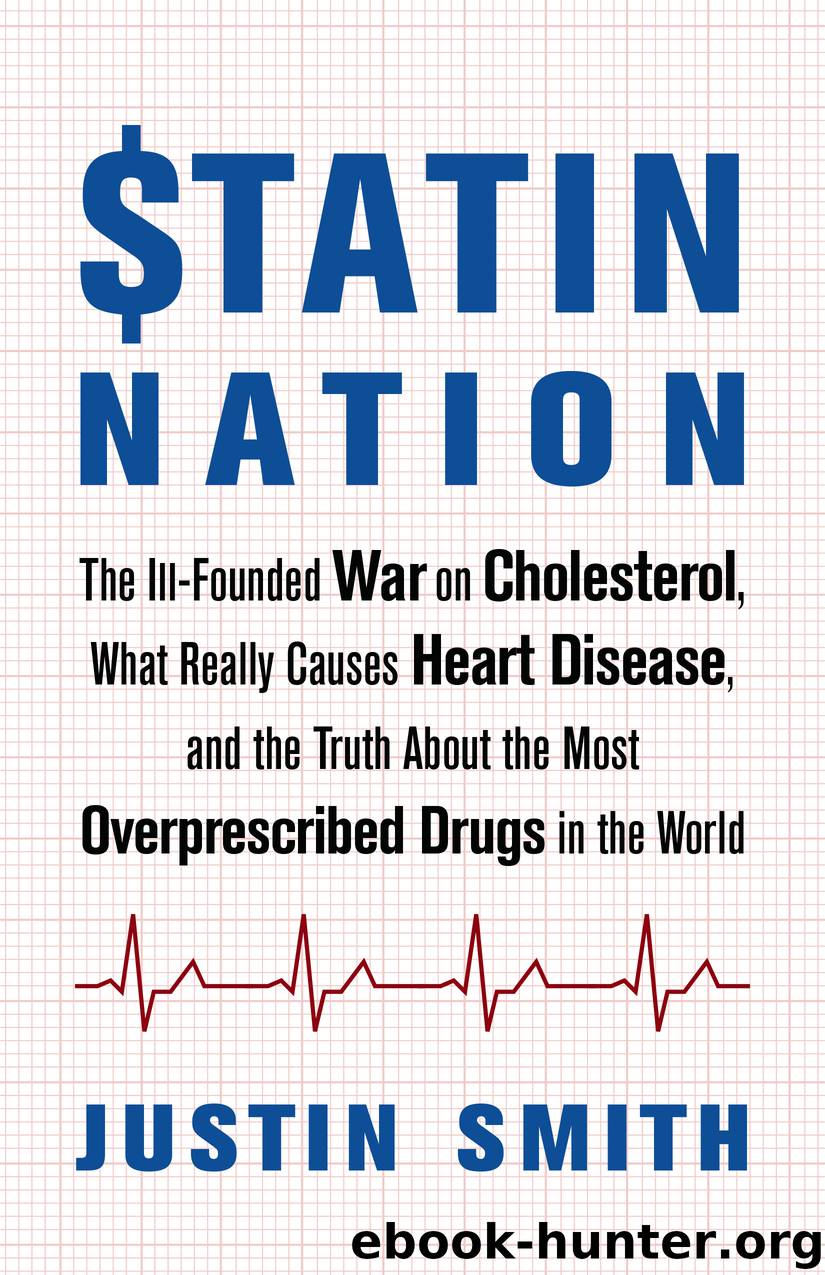Statin Nation by Justin Smith

Author:Justin Smith
Language: eng
Format: epub
Publisher: Chelsea Green Publishing
Published: 2017-11-21T15:14:06+00:00
As with all things, different people react in different ways to fruits. Fruits are generally healthy, and increased fruit consumption is also linked with a reduced risk of heart disease.13 However, many health practitioners feel that eating too much fruit can bring blood glucose levels out of balance, at least for some people. Fruit contains a lot of sugar, and at a certain level of fruit consumption, depending on the individual, the high sugar intake from the fruit can increase blood glucose levels and counter fruits’ otherwise health-promoting qualities.
As a general guide, feeling hungry soon after eating fruit is a good indication that one’s metabolism is sensitive to the sugars in fruit, and therefore fruit intake should be limited. The real danger, however, is associated with fruit juice. A piece of fruit contains fiber that helps slow down the absorption of the sugar. Juicing removes the fiber, which means the body gets a massive sugar hit in just a few gulps.
Homocysteine and B Vitamins
Homocysteine is a naturally occurring substance in the blood, high levels of which have been linked in a number of studies with an increased risk of heart disease. It was established some time ago that taking supplemental folic acid, vitamin B6, and vitamin B12 lowers homocysteine levels.14 Understandably, these findings led to a fair amount of excitement and anticipation, since the results suggested simply adding these supplements to the diet could significantly reduce heart disease risk.
A number of clinical trials have now been conducted whereby people with existing heart disease have been given folic acid, vitamin B6, and vitamin B12 supplements. In each case homocysteine levels have been lowered, but unfortunately, none of the studies have shown any actual direct cardiovascular benefit.
The Norwegian Vitamin Trial (NORVIT), for example, included 3,749 men and women who had suffered a heart attack within seven days prior to the start of the trial.15 Participants were split into four groups: a vitamin B6 group; a folic acid and vitamin B12 group; a folic acid, vitamin B12, and vitamin B6 group; and a placebo group. After about forty months, the researchers looked at the data and found that although homocysteine levels had been reduced significantly, there was no evidence of this translating into any actual cardiovascular benefit.
The Heart Outcomes Prevention Evaluation (HOPE-2) trial, which included 5,522 patients with vascular disease or diabetes, found similar results: a reduction in homocysteine but no reduction in heart attacks, although this trial also saw a reduction in the number of nonfatal strokes in the group who took folic acid, vitamin B6, and vitamin B12.16
Another trial included 5,442 female health professionals in the United States who had either a history of cardiovascular disease or three or more heart disease risk factors. Participants were given folic acid, vitamin B6, and vitamin B12, or a placebo, for seven years. Again, homocysteine levels were reduced, but this did not translate into heart health benefits.17
For the most part, participants in these trials have, at the same time as taking the supplements, been taking a range of cardiovascular medications.
Download
This site does not store any files on its server. We only index and link to content provided by other sites. Please contact the content providers to delete copyright contents if any and email us, we'll remove relevant links or contents immediately.
| Dictionaries & Terminology | Drug Guides |
| Education & Training | Instruments & Supplies |
| Medical Atlases |
Periodization Training for Sports by Tudor Bompa(8272)
Why We Sleep: Unlocking the Power of Sleep and Dreams by Matthew Walker(6725)
Paper Towns by Green John(5191)
The Immortal Life of Henrietta Lacks by Rebecca Skloot(4588)
The Sports Rules Book by Human Kinetics(4386)
Dynamic Alignment Through Imagery by Eric Franklin(4217)
ACSM's Complete Guide to Fitness & Health by ACSM(4060)
Kaplan MCAT Organic Chemistry Review: Created for MCAT 2015 (Kaplan Test Prep) by Kaplan(4012)
Livewired by David Eagleman(3774)
Introduction to Kinesiology by Shirl J. Hoffman(3772)
The Death of the Heart by Elizabeth Bowen(3622)
The River of Consciousness by Oliver Sacks(3604)
Alchemy and Alchemists by C. J. S. Thompson(3522)
Bad Pharma by Ben Goldacre(3428)
Descartes' Error by Antonio Damasio(3279)
The Emperor of All Maladies: A Biography of Cancer by Siddhartha Mukherjee(3163)
The Gene: An Intimate History by Siddhartha Mukherjee(3098)
The Fate of Rome: Climate, Disease, and the End of an Empire (The Princeton History of the Ancient World) by Kyle Harper(3067)
Kaplan MCAT Behavioral Sciences Review: Created for MCAT 2015 (Kaplan Test Prep) by Kaplan(2986)
